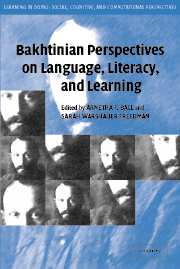Book contents
- Frontmatter
- Contents
- List of Contributors
- Acknowledgments
- PART I IDEOLOGIES IN DIALOGUE: THEORETICAL CONSIDERATIONS
- PART II VOICED, DOUBLE VOICED, AND MULTIVOICED DISCOURSES IN OUR SCHOOLS
- 5 Performance as the Foundation for a Secondary School Literacy Program: A Bakhtinian Perspective
- 6 Double Voiced Discourse: African American Vernacular English as Resource in Cultural Modeling Classrooms
- 7 Narratives of Rethinking: The Inner Dialogue of Classroom Discourse and Student Writing
- 8 Ever Newer Ways to Mean: Authoring Pedagogical Change in Secondary Subject-Area Classrooms
- Voices in Dialogue – Multivoiced Discourses in Ideological Becoming
- PART III HETEROGLOSSIA IN A CHANGING WORLD
- PART IV A CLOSING THOUGHT ON BAKHTINIAN PERSPECTIVES
- Author Index
- Subject Index
- Titles in the series
- References
6 - Double Voiced Discourse: African American Vernacular English as Resource in Cultural Modeling Classrooms
Published online by Cambridge University Press: 24 May 2010
- Frontmatter
- Contents
- List of Contributors
- Acknowledgments
- PART I IDEOLOGIES IN DIALOGUE: THEORETICAL CONSIDERATIONS
- PART II VOICED, DOUBLE VOICED, AND MULTIVOICED DISCOURSES IN OUR SCHOOLS
- 5 Performance as the Foundation for a Secondary School Literacy Program: A Bakhtinian Perspective
- 6 Double Voiced Discourse: African American Vernacular English as Resource in Cultural Modeling Classrooms
- 7 Narratives of Rethinking: The Inner Dialogue of Classroom Discourse and Student Writing
- 8 Ever Newer Ways to Mean: Authoring Pedagogical Change in Secondary Subject-Area Classrooms
- Voices in Dialogue – Multivoiced Discourses in Ideological Becoming
- PART III HETEROGLOSSIA IN A CHANGING WORLD
- PART IV A CLOSING THOUGHT ON BAKHTINIAN PERSPECTIVES
- Author Index
- Subject Index
- Titles in the series
- References
Summary
Language is a powerful mediator of learning. It is the dominant medium through which communication occurs, and it provides humans with symbolic resources through which to manipulate ideas and solve problems. The study of literature is directly situated on the plains of language use. Literary texts are themselves multilayered. Readers stand in dialogic relationship to the multiple layers of potential meaning that the language of literature conveys. In this chapter, I describe an apprenticeship into literary response in a high school serving African American students who are speakers of African American Vernacular English (AAVE).
Bakhtin provides a set of constructs through which to analyze the role that AAVE discourse norms played in socializing students into a complex literate practice. The focus on AAVE with these students is important for several reasons. First, a majority of the students had standardized reading scores well below the 50th percentile. The high school had a history of underachievement. The students learned to tackle challenging problems of interpretation in very difficult literary texts within a short period of time, despite their low reading scores. In addition, the variety of English that served as their primary medium of communication (i.e., AAVE) has been denigrated in the academy and viewed more as a detriment than a resource (Bereiter & Engelmann, 1966; Orr, 1987; Stotsky, 1999). Because these student attributes are more often than not viewed as detrimental, it is useful to understand how the students' language resources supported learning.
- Type
- Chapter
- Information
- Bakhtinian Perspectives on Language, Literacy, and Learning , pp. 129 - 147Publisher: Cambridge University PressPrint publication year: 2004
References
- 9
- Cited by

